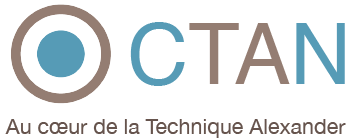
Teacher or Complementary Therapist?
The False Dilemma
The Alexander Technique community often debates whether we are « teachers » or « complementary therapists. » This seemingly simple question might reveal a deeper challenge: both labels, when left undefined, could create confusion rather than clarity. Perhaps the issue isn’t necessarily about choosing sides, but about exploring whether our current frameworks adequately serve both practitioners and those who seek our help.
Historical Context and Modern Evolution
When F.M. Alexander developed his technique in the late 19th century, much of the therapeutic paradigm tended to be more passive – patients often received treatment while therapists took most of the responsibility for the healing process. Defining his work as « educational » may have been both a genuine reflection of his approach and a practical response to the medical climate of his time.
Today’s landscape is radically different. Modern clients actively seek help to change and grow, taking responsibility for their own wellbeing. Whether this help comes from a « teacher » or a « therapist » matters less than finding effective guidance for personal transformation.
The Problem of Undefined Labels
Both terms « teacher » and « therapist, » without clear definition, become empty containers filled with cultural stereotypes – exactly the kind of preconceptions the Alexander Technique seeks to free us from. When we use familiar words to describe an unfamiliar experience, we inevitably create misaligned expectations.
In Alexander’s time, choosing to identify as « teachers » could also have served to create some separation from the medical and therapeutic world of that era.
In an era lacking modern intellectual property protection systems, clearly defining one’s professional identity also served to preserve the integrity and authenticity of the work developed. Creating a specific professional category – « Alexander Technique teacher » – represented a way to distinguish oneself in a landscape where innovative approaches could easily be diluted or misunderstood. It was probably a strategic choice that allowed greater freedom of action in a context where the medical field was defining its boundaries with increasing rigor, while simultaneously protecting the specificity of the method.
Every professional label carries cultural baggage. Our responsibility is to clearly redefine these terms in our context, or risk perpetuating the very misconceptions our work seeks to address.
How « Teacher » Could Create Contradictions
- Traditional teaching focuses on content, measurable results, and linear objectives
- The Alexander Technique emphasizes process, subtle awareness, and non-linear exploration
- Traditional teaching maintains a vertical teacher-student hierarchy
- The Alexander Technique creates horizontal, collaborative relationships
- Traditional teaching is about « doing well » and skill acquisition
- The Alexander Technique focuses on « non-doing » (inhibition) and quality of experience
« Non-doing » must be experienced before it can be understood – it’s a quality of awareness that emerges through direct experience. This raises a question: are we « teaching » in the conventional sense, or facilitating something more subtle?
The complementary therapy framework might describe more precisely what many already do: creating conditions for new qualities of awareness to emerge naturally. It’s not about abandoning what works, but considering whether a different conceptual framework might serve better.
The Complementary Therapy Framework
- Focuses on strengthening awareness and self-regulation
- Promotes personal empowerment and resource development
- Adopts holistic, process-oriented approaches
- Explicitly values direct experience and suspension of habitual patterns
- Honors the uniqueness and traditions of each specific method while maintaining methodological integrity
- Emphasizes practical, embodied work rather than theoretical approaches – integrative and inclusive by nature
- Recognizes transformation and growth as an ongoing process for both client and practitioner
The original Greek « therapeia » simply meant « care » or « service » – not treatment of diseases!
Professional Standards and Public Expectations: The Swiss Model
In Switzerland, complementary therapies have evolved into well-defined and formally recognized professions. The Swiss federal government supports complementary therapy through higher professional training that has been integrated into the official national educational curriculum.
The contribution offered by a third party specialized in the educational and training context provides not only a specialized perspective but also potential guarantees for professionals, the public, and institutions that certain criteria, parameters, and professional standards are respected in the content, form, and architecture of such projects. In complementary approaches like the Alexander Technique, practitioners sometimes tend to focus internally on their evaluations and assessments, making external specialized perspectives particularly valuable.
This institutional recognition offers a concrete example of how complementary therapy can be valued as an autonomous discipline, with its own body of knowledge, skills, and professional standards. The Swiss model suggests that it is possible to reconcile the complementary approach with contemporary requirements of professionalism, quality, and integration into healthcare and educational systems.
Beyond Labels: Clear Communication
The real challenge isn’t choosing the right label, but clearly defining what we mean by whatever label we use. In our contemporary context, where clients are conscious participants in their growth, what matters most is transparent communication about:
- The nature of our collaborative relationship
- The unique, process-oriented approach of the Alexander Technique
- How our work transcends conventional expectations of both teaching and therapy
Conclusion
Whether we call ourselves teachers or complementary therapists, our responsibility remains the same: to clearly communicate that clients are embarking on a journey that transforms conventional expectations of both teaching and therapy.
The evolution toward greater personal responsibility in health creates opportunities. We can now engage with clients ready for collaborative, exploratory relationships – regardless of our professional title. The key is ensuring that our chosen label clarifies rather than obscures the unique nature of our work. The Alexander Technique invites us beyond rigid categorizations. Perhaps it’s time for our professional identity to reflect that same openness in transcending limiting definitions.
©2025 Ettore ARCAIS
Complementary Therapist with Advanced Federal Diploma of Professional Education and Training OrTra TC
Director of CTAN, the Alexander Technique Professional Training Center in Neuchâtel, Switzerland
Photo by Siora Photography
#alexandertechnique #techniquealexander #alexandertechniquetraining #alexandertechniqueswitzerland
